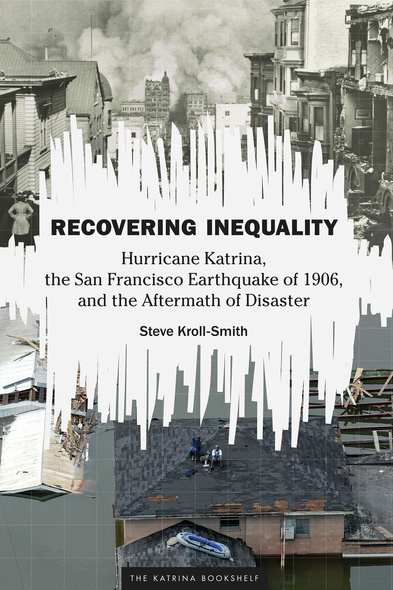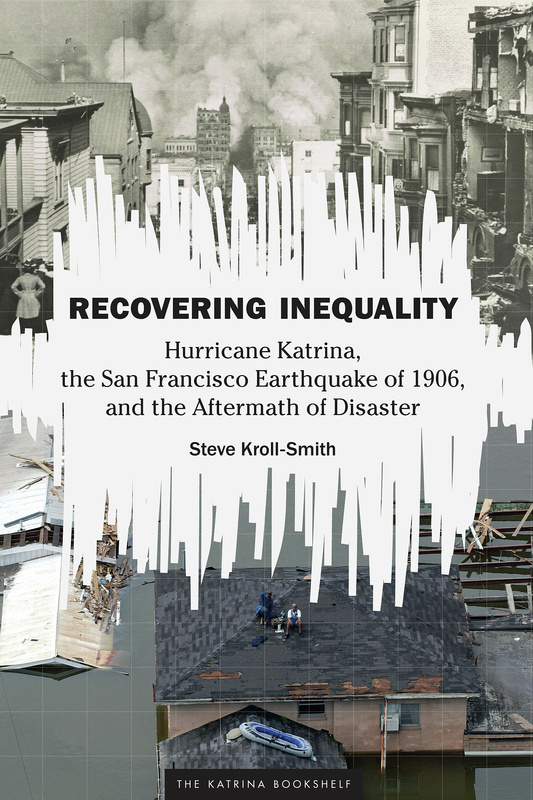
Recovering Inequality
Hurricane Katrina, the San Francisco Earthquake of 1906, and the Aftermath of Disaster
A lethal mix of natural disaster, dangerously flawed construction, and reckless human actions devastated San Francisco in 1906 and New Orleans in 2005. Eighty percent of the built environments of both cities were destroyed in the catastrophes, and the poor, the elderly, and the medically infirm were disproportionately among the thousands who perished. These striking similarities in the impacts of cataclysms separated by a century impelled Steve Kroll-Smith to look for commonalities in how the cities recovered from disaster. In Recovering Inequality, he builds a convincing case that disaster recovery and the reestablishment of social and economic inequality are inseparable.
Kroll-Smith demonstrates that disaster and recovery in New Orleans and San Francisco followed a similar pattern. In the immediate aftermath of the flooding and the firestorm, social boundaries were disordered and the communities came together in expressions of unity and support. But these were quickly replaced by other narratives and actions, including the depiction of the poor as looters, uneven access to disaster assistance, and successful efforts by the powerful to take valuable urban real estate from vulnerable people. Kroll-Smith concludes that inexorable market forces ensured that recovery efforts in both cities would reestablish the patterns of inequality that existed before the catastrophes. The major difference he finds between the cities is that, from a market standpoint, New Orleans was expendable, while San Francisco rose from the ashes because it was a hub of commerce.
This book exposes the inherent inequalities in American society, especially visible in times of crisis, and offers a sobering account at how social hierarchies are upheld even when given the ideal opportunity for redress. It is a valuable addition to disaster scholarship.
[A] provocative book that will prompt its readers to think seriously about how market forces can influence the aftermath of a natural disaster and the inequality of treatment of the poor, elderly and sick.
[A]n academic read that shines a light on the idea of 'recovery' to examine how many of the factors guiding a city's trajectory after disaster perpetuate inequality.
Echoing W.E.B. DuBois’ ingenious interdisciplinary combinations of poetry, history, quotes, and statistics, Kroll-Smith combines fictional renderings, newspaper clippings, policy decisions, and first-hand descriptions with rhythmic prose to create a page-turning analysis of the similarities and differences between two iconic U.S. disasters...Retelling the story of these two disasters side by side, Kroll-Smith is able to illuminate that our failures to respond swiftly and justly after tragedies is not just an isolated occurrence but the pattern.
Revelatory…Written with engaging and often eloquent turns of phrase, [Recovering Inequality] is the work of a sociological mind atop its craft and respectful of readers' time and intellect.
An accessible and illuminating work...Kroll-Smith has produced a rare specimen: an academic book that is illuminating, theoretically rich, and a pleasure to read. His prose is deft and light, his eye for detail is vivid, and the book is illustrated throughout with photographs from both the archival record and the author's own collection.
This is an inspired, illuminating, often anguished comparison. Stimulating fresh questions, Recovering Inequality teaches many lessons about the sources of urban catastrophe, whether by fire or water, and reveals how recurring, indeed deep-rooted, processes shaped social hierarchies both in revitalized San Francisco and rebuilt New Orleans.
In this study of two iconic American cities and the aftermath of disaster, Kroll-Smith masterfully reveals how the process of post-disaster reconstruction reflects and expresses the fundamental tensions and contradictions in our social, economic, and environmental relations.
This book pushes the boundaries of scholarship on disasters, asking sobering questions about the role of market forces in disaster recovery. While retaining what anthropologists call ‘thick description’ of both case studies, the book offers rich theoretical insights, zooming out to Marx, Durkheim, Weber, and the foundations of modern US sociology.
This book makes important contributions to the field of disaster social science specifically and sociology more broadly. Recovery is one of four major phases of the disaster cycle, but the concept lacks clarity in the broader literature. Traditional views of recovery as a ‘return to normal’ and ‘setting things right’ obscure more than enlighten the nuances of ‘recovery.’ This book’s focus on inequality provides much-needed insight on this phase of disaster. Its focus on market forces in re-establishing unequal social statuses and determining the worthiness of receiving relief promotes a re-examination of this important phase of disaster recovery.
Steve Kroll-Smith is a professor of sociology at the University of North Carolina at Greensboro and was formerly a research professor of sociology at the University of New Orleans. He is the coauthor of Left to Chance: Hurricane Katrina and the Story of Two New Orleans Neighborhoods.
- Acknowledgments
- Foreword by Anthony Oliver-Smith
- From Whence Recovery? A Prelude
- I. An Introduction
- 1. “The Earth Dragon” and “Miss Katrina”
- 2. Geographies of Inequality: A Sketch of Two Cities Spanning a Century
- II. Deranging and Rekindling
- 3. The Great Derangements
- 4. Fashioning “the Looter”: Rekindling Racial and Class Kinds
- III. Rebooting Inequality, the Road to Recovery
- 5. Disaster Relief: Parsing the Vernaculars of Worthiness
- 6. Spatial Accumulation by Dispossession: Two Attempts to Rob the Marginal
- 7. One City Necessary, One City Expendable
- By Way of Closing
- Notes
- Index




